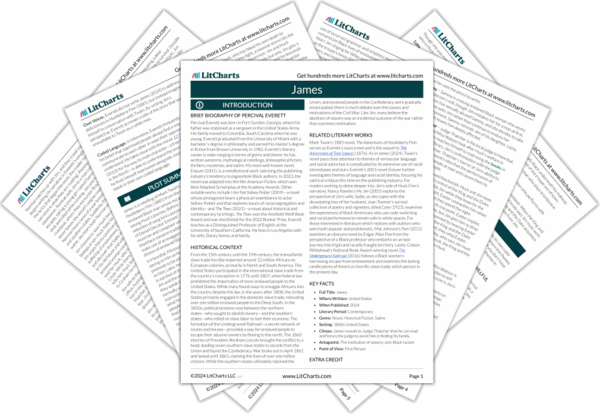Daniel Decatur Emmett Quotes in James
I made eye contact with a couple of people in the crowd and the way they looked at me was different from any contact I had ever had with white people. They were open to me, but what I saw, looking into them, was hardly impressive. They sought to share this moment of mocking me, mocking darkies, laughing at the poor slaves, with joyful, spirited clapping and stomping. I looked at one woman who might have been intrigued by me or taken with me, the entertainer. I saw the surface of her, merely the outer shell, and realized that she was mere surface all the way to her core.
Slaves didn’t have the luxury of anxiety, but at that moment, I had felt anxiety. Slaves didn’t have the luxury of anger toward a white man, but I had felt anger. The anger was a good bad feeling. In addition, my feelings about Daniel Emmett were complicated, confused. He bought me, yes, but reportedly not to own me, though he expected something from me—my voice, he claimed. I wondered what he would do if I tried to leave. In my head I could hear him shouting, “But I paid two hundred dollars for you.” A man who refused to own slaves but was not opposed to others owning slaves was still a slaver, to my thinking.
Massa Corey bring me cone bread,
Hoo Ya Hoo Ya!
Massa Corey bring me cone bread,
He makes da boat go.
I opened an eye and watched him awhile, then shut it again because I did not like the sight. Unfortunately, neither I nor the engine’s roar could block out the sound of his dreadful singing.
[…]
I imagined Norman upstairs, nervous, but perhaps physically comfortable, not hot and covered with soot, but no doubt more frightened than I was, more lost. I wondered if he was angry. I wondered if I had ever not been angry.

Daniel Decatur Emmett Quotes in James
I made eye contact with a couple of people in the crowd and the way they looked at me was different from any contact I had ever had with white people. They were open to me, but what I saw, looking into them, was hardly impressive. They sought to share this moment of mocking me, mocking darkies, laughing at the poor slaves, with joyful, spirited clapping and stomping. I looked at one woman who might have been intrigued by me or taken with me, the entertainer. I saw the surface of her, merely the outer shell, and realized that she was mere surface all the way to her core.
Slaves didn’t have the luxury of anxiety, but at that moment, I had felt anxiety. Slaves didn’t have the luxury of anger toward a white man, but I had felt anger. The anger was a good bad feeling. In addition, my feelings about Daniel Emmett were complicated, confused. He bought me, yes, but reportedly not to own me, though he expected something from me—my voice, he claimed. I wondered what he would do if I tried to leave. In my head I could hear him shouting, “But I paid two hundred dollars for you.” A man who refused to own slaves but was not opposed to others owning slaves was still a slaver, to my thinking.
Massa Corey bring me cone bread,
Hoo Ya Hoo Ya!
Massa Corey bring me cone bread,
He makes da boat go.
I opened an eye and watched him awhile, then shut it again because I did not like the sight. Unfortunately, neither I nor the engine’s roar could block out the sound of his dreadful singing.
[…]
I imagined Norman upstairs, nervous, but perhaps physically comfortable, not hot and covered with soot, but no doubt more frightened than I was, more lost. I wondered if he was angry. I wondered if I had ever not been angry.











